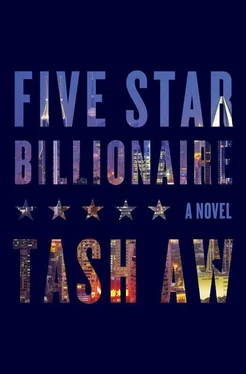The first noise they heard was strange and unrecognizable, as if disconnected from time and space: firecrackers at this time of the year? No way: not the usual rapid chatter but a single sound that punctured the silence of the night with the violence of a whip on flesh, the shattering of a sound barrier by a jet in the sky. The dog barking. And then — one, two, three seconds later? — another noise, and this time they knew. She had never heard a gunshot before, but somehow Yinghui recognized it. The dog was barking furiously now — not its low, lazy calls but a hysterical high-pitched yelp, as if choking, over and over, as if it would never stop. Yinghui ran out the door into the front yard, across the small stretch of lawn — the last bit of the garden that hadn’t been built over — and onto the driveway. She could hear her mother behind her, screaming, “Be careful, come back, be careful.” Her father lay on the concrete, facedown, hands bunched together near his face, as if searching for some microscopic object in the earth. In the darkness, the pool of blood that was seeping out under him appeared black and inky against the paleness of the concrete. She looked around, but she knew that she would see no one, knew that she was not in danger, knew that this was the full stop in the messy story that had spanned the whole of the last year, the one everyone referred to as “the scandal.” She crouched down next to her father, thinking that maybe she might hear gurgled, frothy breaths. She could feel the blood — tepid and moist on her hands and ear. She could feel the warm presence of her father’s body, as if he were still alive. But she could hear nothing. Just the dog barking, crazed and strangulated; her mother standing at the door to the house, shouting, “Come back, be careful,” over and over again. The word “careful” was stretched by her low cries; it rang out in the night, care fuuuuul , care fuuuuuuuuul . And then her mother was sobbing, a deep moaning sob.
And Yinghui thought: It was better this way. It felt like a relief. She remained crouched by her father’s side for a long time, knowing he was dead, comforted by the certainty of it. She did not shout out, “Call for an ambulance,” the way people did in films; she just stayed there, bunched up next to her dead father, listening to her mother’s animal wail settling into a rhythm. And the fat German shepherd barking its hysterical bark, its owners unable to calm it.
Why did they do it? Her mother would ask that question over and over again in the days that followed. He was already ruined; his life was over. They didn’t have to kill him twice. What had he done that was so wrong? He had never hurt anyone; he never hurt anyone in his whole life.
The newspapers adopted the same tone: He was a good, hardworking man who left behind a grieving wife and daughter. There were photos of Yinghui holding her mother’s arm after the funeral, her mother’s face collapsed in anguish; in her pain, she was oblivious to the cameras. It was always like this with Asian people, thought Yinghui: When a man is alive, he is vilified; when he is dead, he is honored. And yet, every time there was an article about his death, there was a little line right at the end of the piece, a footnote to his life: In the last year of his life, he was involved in a lengthy court case arising from accusations of corruption, but was acquitted of all the main charges . It was a case of footnotes being more important than the book itself, and Yinghui could not ignore the barb in these throw-away comments, as if every article about him was designed to rob him of all the respect he had wanted, all the respect he had accumulated throughout his life.
“I honestly can’t remember all the details,” Yinghui said, feeling the warmth of Walter’s body; his shirt was getting damp with sweat, for even though it was late, the night was still warm. “It was all so long ago.”
FURTHER NOTES ON HOW TO BE CHARITABLE
Some months ago I had a very interesting meeting with a highly principled young woman who works in the planning department of Shanghai Municipal Council. She is a bright, educated person in her early forties who, in a few years’ time, might easily be the mayor of this great metropolis. But for now she is not yet even the head of the department; she is only one of the deputy heads, with a particular responsibility for preservation and heritage — a thankless task if ever there was one: Look at all the relentless development going on across the city! Nonetheless, she does her job admirably, for she is good with details and vigorous in her approach. She is a touch unimaginative, I might add, unwilling to take risks beyond the strict confines of her job. But, still, those are qualities that make her admired in her post, and I daresay she will be head of her division within the next year.
I got her name from local contacts of mine who thought I would find her interesting, given my record of involvement with conservation and my present interest in sustainable development. So I invited her for a business lunch at a quiet restaurant, and I must say, I left the meeting feeling more than satisfied.
She has a daughter who is seventeen and brilliant in her studies, she explained to me over lunch. This young girl has been top of her class every year since the age of ten and dreams of going to Stanford, where she has already won a place. Congratulations! I cried; you must be very happy. But why do you seem sad and worried?
Well, the woman replied, it is because I can’t afford to send her there; tuition fees in the United States are just too expensive.
It turns out that this noble woman is married to a rather feckless petty businessman, who was pampered by his parents and has a tendency to gamble away his earnings in Macau. He recently went to the newly opened casino in Singapore and lost RMB 40,000 of their savings. Even with her respectable salary, there is no way they can afford to send their daughter to the States.
I sighed. This sort of situation is so common in China these days — a woman battling the odds while accommodating a deadweight of a husband.
“Maybe I could help,” I said.
She looked at me, at once confused and hopeful.
I was touched by the plight of this poor girl, I explained. I am moved by people with extraordinary dreams, and this girl wants to be an astronaut in a country where people yearn only to be bankers and businessmen. I would pay her tuition fees, I said.
“But how?” the woman asked, startled and at a loss for words. “I … you don’t even know me. What could I possibly do to repay you?”
“Nothing,” I said. “This is an act of charity. I, too, was in your daughter’s position, full of dreams, but no one came to help me. Now that I am in a position to change someone’s life for the better, I will.”
“I feel so humbled; I feel at your service,” she continued. If we had not been sitting down, she would have been bowing and scraping. I began to feel quite embarrassed by her over-effusive display of gratitude.
“Please, you’re making me feel uncomfortable. What I am doing is not extraordinary — it should be normal in our world; it should happen more often. Think of it as a just reward for all your hard work. I am …” I paused to find the right words. “I am so impressed by the way you perform your job.”
“You will really do this for a complete stranger?” she continued. “You are an outstanding man. But my colleagues and family will be astonished. How will I explain it to them? Is it possible? Oh, my heavens, I don’t believe it, I don’t believe it. And …” She suddenly looked startled. “What if they think I am corrupt? China is so riddled with that sort of thing these days.”
Читать дальше
Конец ознакомительного отрывка
Купить книгу


![Scott O’Hara - Five-Star Fugitive [= Border Town Girl]](/books/432138/scott-o-hara-five-thumb.webp)









